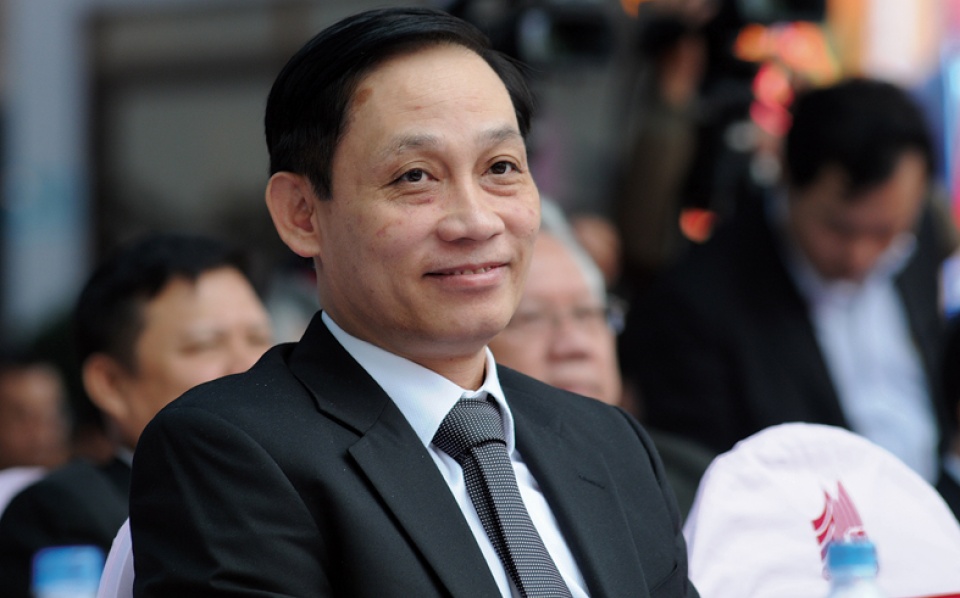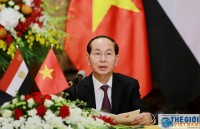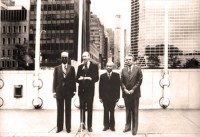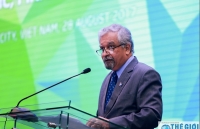
Marking 40 years as part of the United Nations
Latest
| TIN LIÊN QUAN | |
| Vietnam’s 40-year UN membership marked in Geneva | |
| Vietnam celebrates 40 years in UN with brocade show | |
How do you assess Vietnam’s contributions to the UN over the last 40 years? What have been the most important turning points?
Vietnam realised the importance of the UN from its earliest days. This is evident in President Ho Chi Minh’s message to the President of the UN General Assembly on January 14, 1946. Due to historical circumstances, Vietnam finally became an official member of the UN on September 20, 1977. With its struggle for national independence and unification, Vietnam has made great contributions to the realisation of the UN's noble goals and ideals of peace and sovereignty. In striving for national self-determination, Vietnam has contributed to the collapse of colonialism worldwide.
 |
| Deputy Foreign Minister Le Hoai Trung. |
Since becoming a member of the UN, Vietnam has grown increasingly involved with the organisation, contributing substantially to UN activities and becoming an active and responsible UN partner and member country. It is possible to summarise Vietnam's contributions on the three following issues.
First of all, Vietnam has always been at the forefront of the fight for national independence, respect for sovereignty and equality for all nations. The country highly values the protection of peace and international security, universal and radical disarmament, while supporting struggles against colonialism. Vietnam actively contributes to the process of formulating and implementing UN treaties and conventions, which form the foundation of the existing international legal system; at the same time, in association with friends and developed countries, promoting the process of building a global multilateral system that is fair, clear and effective, meeting the aspirations of humankind.
Secondly, with new and emerging forces, Vietnam is increasingly involved in many areas of UN activities, such as sending forces to participate in UN peacekeeping operations. It has marked a number of milestones in the process of planning and implementing UN policy, particularly the successful promotion of the Millennium Development Goals (MDGs), and leading the way in implementing the “Delivering as One” Initiative. Vietnam has also made important contributions to the development and application of major global agreements within the UN framework, in particular the 2030 Agenda for Sustainable Development, the Paris Climate Change Agreement, and the UN initiative on coping with El Nino and La Nina.
Thirdly, Vietnam has been and is a member of many important UN organs such as: UN Security Council (2008-2009), UN Economic and Social Council (1998-2000 and 2016-2018), Human Rights Council (2014-2016), UNESCO Executive Council (2015-2019) and UN International Law Commission (2017-2021). The country has contributed positively to the work of these bodies and proposed many initiatives which are both priority areas for Vietnam and for the international community. These efforts and contributions have been highly appreciated by the international community, which is reflected in the fact that Vietnam always garners a high number of votes.
Since Vietnam joined the UN in 1977, there have been 2 important turning points, marking a quantative transition in Vietnam - UN relations.
The first turning point happened in the late 1980s and early 1990s, when Vietnam began its Doi Moi reforms, Vietnam had succeeded in reaching a peaceful solution to the problem with Cambodia within the UN framework. This heralded a new era in the implementation of Vietnam's comprehensive policy with the UN in particular and multilateral foreign policy and international integration in general.
The second turning point, which marked a substantial change in the Vietnam-UN relationship as well as in Vietnam's multilateral external relations, was Vietnam’s election as a non-permanent member of the UN Security Council for the 2008-2009 term with a high number of votes, and the successful completion of its mission.
While joining the World Trade Organization (WTO) in 2007 began Vietnam's comprehensive international integration in the fields of economics and trade, becoming a non-permanent member of the UN Security Council has shown that Vietnamese diplomacy has evolved and was capable of contributing substantially to address world peace and security issues that involve many complex political aspects.
In running for the 2020-2021 tenure of the UN Security Council, what are Vietnam’s advantages? If elected, how will Vietnam contribute to the Council?
Based on my experience in the 2008-2009 tenure of the Security Council, I think Vietnam’s advantages are as follows.
Firstly, over 30 years of comprehensive reform, the position and strength of Vietnam has grown significantly, with foreign relations developed in both breadth and depth. Vietnam has established strategic and comprehensive partnerships with 26 countries, including all five permanent members of the UNSC and most major countries in the region and the world.
Secondly, Vietnam’s foreign policy towards independence, self-reliance and accountability on international issues is highly valued. Many countries, especially major and important partners, appreciate Vietnam's role and contribution at multilateral and regional forums, and expect Vietnam to continue to participate and contribute more extensively on important issues of international peace and security.
Thirdly, the attitude and viewpoint of Vietnam on the issues discussed at the UNSC basically correspond to the common interests of the international community. Vietnam supports efforts and initiatives to peacefully settle conflicts and disputes based on international law. The country stands against abuse of power, repression and arms proliferation, instead promoting dialogue and international cooperation to address current global challenges.
Finally, Vietnam has accumulated valuable experience in running, preparing and successfully operating as a non-permanent member of the UN Security Council for the 2008-2009 term, member of the UN Security Council (2014-2016), ECOSOC (2018-2020), and in its hosting of APEC (2017). These are the reasons for countries to vote for Vietnam.
However, running for membership of the UNSC poses a number of challenges. The biggest is the heated competition between countries for a seat on the Council.
In order to fulfill its role as a member of the UN Security Council, Vietnam will promote the principles and objectives of the UN Charter, ensure cooperation and dialogue is used to prevent and solve conflicts and disputes on the basis of respect for international law, and continue the fight against the proliferation of weapons of mass destruction.
Recognising the importance of peace and security in the region and the world, Vietnam has been actively involved in UN peacekeeping operations in Africa, and is willing to share its experience as a country that succeeded in addressing the issues of post-war reconstruction.
 | Vietnam considers cooperation with UN a top priority: State President President Tran Dai Quang has granted the media an interview on the occasion of the 40th anniversary of Vietnam’s accession to the United Nations (UN) ... |
 | Vietnam's hallmark in the UN On September 20, 1977, Vietnam officially joined the United Nations (UN). The event opened a new chapter in the process of Vietnam’s international integration. |
 | Vietnam – UN: A mature and equal partnership In the decades after Doi Moi, the United Nations (UN) made significant contributions to Vietnam. However, in recent years the relationship between Vietnam and the UN ... |

















